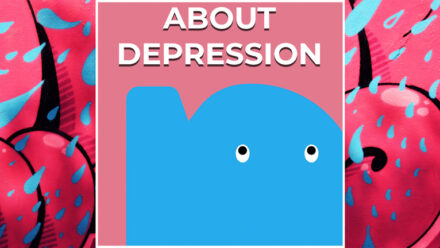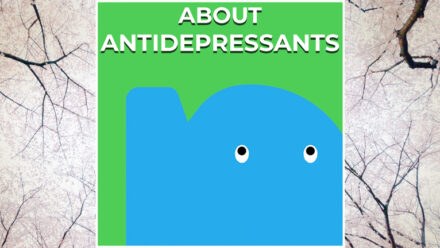
About 12 years ago, many people who were dear to me passed away shortly after another. In the following period, I was overwhelmed by feelings of great sadness. I told myself that I just had to get over it. After all, life goes on, so stop crying about the past. But in doing so, I completely ignored my true feelings. Eventually, I was struck by a serious depression…
“That’s how I ended up in the clinic of a psychiatric hospital. During one of my therapies, some unpleasant images started to surface from the abuse I suffered in my childhood. I was confronted with suppressed memories of sexual abuse. The horrific images were now stuck in my mind. The depression I was already suffering from, now joined forces with this reality and the emotions caused by the abuse.
This shocking confrontation was followed by lots of therapy
I was taken into care at a psychiatric hospital twice, both as an outpatient and admitted. Looking back on that time, I now realise I never felt like working together with the care workers throughout those horrible years. Of course I had a safe relationship with some of them, but we never worked hand in hand.
No cooperation without an equal relation
The care I received never seemed an equal relation. Simply because I never felt equal to the professionals who cared for me. I did nothing, but just passively endured everything. The care worker had a treatment plan, and he just laid it on me, the patient. When pills were prescribed to me, I took them. When a therapy programme was presented to me, I followed it. If I ever had any opinion of myself about my medication of therapies, I never spoke out. In those miserable years, I was simply too depressed and passive to do so.
When I recovered a bit during admission, I was allowed to go home for an afternoon
The nurses judged that I was not yet ready to drive myself. I thought I was perfectly capable, and felt belittled. For the first time again in years, I became a bit rebellious. And so I got in my own car, drove home, and back again. It all went very well. But just as I parked my car again in front of the hospital, someone from the nursing team approached. Busted!
They asked me to explain myself and gave me a lecture on what they thought about it. This seriously damaged my relationship with the care team. The consequences of this fall-out were serious: from that moment, I closed off and started to hide my true feelings about delicate matters even more.
I did not dare tell the nurses that they were treating me like a child
They had no right to treat me in this way, because I was an adult. Needing help on one hand, does not make you completely helpless as an overall person. I regret that I did not talk about this. More so because I’m certain it would have been possible, as the care workers genuinely meant the best for me.
The sense of partnership that was missing during my admission time was found later, when I started the GOAL training. This course allows people with a psychiatric background to become mental healthcare worker after a one-year training.
I started the training after many fears and doubts. But after my last stay in the psychiatric hospital, I realized that I had to do something if I never wanted to return there.
It seemed I did not have the strength to live my own life. I just sat and did nothing. I even lost the courage to want anything at all. Scared that it would only lead to more pain.
As a consequence, an anger started to grow inside me. Anger towards my own indecision and the lack of perspectives. Anger towards my care workers, who discouraged me to start the GOAL education. And towards psychiatry in general. because they had failed to help me properly. But especially about the abuse. Yet I never showed the anger, and it only bottled up inside me.
My anger turned out to be what saved me, empowering me to take action
It gave me the energy I needed to change things. To get up and go to the selection interview for the training, even though I was trembling with nerves. To my own great surprise, I was selected. After feeling lost and worthless for so long, this finally caused a spark of hope inside me.
Despite my own fears and insecurities, I started the training. The years of misery had completely robbed me of my self-esteem, and any sense of what I could and what not.
The team spirit during the GOAL training turned me around completely
The solidarity between the trainees brought out the best in me. No one had to feel ashamed here. We recognized ourselves in each other’s stories, and never stopped encouraging each other. But we also corrected each other firmly when necessary. Tensions and conflicts arose, but we always managed to deal with them by remaining honest and open.
During the group assignments, I felt more and more at ease. The sense of safety enabled me to reveal my true self. My self-confidence grew larger and finally I felt like being ‘normal’: studying and getting educated, despite my mental problems.
The teacher was a sensitive woman and expert on psychiatry, treating us as equals and always there for us
More than once I fell back on her. The positive relation with my teacher has been very important for me. Especially when I lost my strength half-way through the training. Along with the support I received from my fellow students and others close to me, the teacher stayed in touch with me and always showed that she had faith in me.
The level of cooperation at the GOAL education was exactly right for me. We understood each other, and had a teacher who was in every sense committed, competent, and always on an equal footing. For me, that provided the support I needed to successfully complete the training. Right after getting my certificate, I found a job as a attendant at an assisted living accommodation.
Once a patient, now a healthcare professional
When I was a patient, I was mostly focusing on my own problems. We as patients shared our psychological suffering and other problems. We took the pills they gave us, feeling sick from their side effects. People stared at us and only saw a group of patients when we passed by. Of course we noticed that they whispered and pointed at us. And we in turn observed our care workers and gossiped about them. In short, I have seen – and endured – both sides of psychiatry in my life: first that of the patient, and later the care worker’s.
People often ask me what the added value of my patient experience is as a care worker
To be honest, I sometimes get the impression that the question often comes from mistrust. What could possibly be useful about my experience as a patient? Is patient experience valuable at all? How capable can a patient really be, after all?
However, I find it very useful to draw upon my former experience when working as a healthcare professional. I use my experiences, yet never put them at the forefront. What others think of that, doesn’t really concern me anymore. As a care worker, I face the same pitfalls as my colleagues, but since I’ve seen the other side as well, my perspective is different.
Daphne, a woman under my treatment, asked me to go with her to the psychiatric hospital
She had to be admitted because of a change of medication. I suggested to drive her to the hospital with my car. But Daphne would rather drive there herself. I tried to convince her, but she refused and got annoyed. And suddenly I realised! I was doing exactly what my care workers did to me back then. Daphne was still able to take up some responsibilities, and I was taking them away. I almost slapped myself in the face! I quickly apologized and drove behind Daphne as she went with her own car.
I now feel that same tension between the responsibilities of the client and the care worker
Sometimes I go too far in taking care of people, while I should only support them. The desire to be in control of the situation, or quickly fix what must be done, leads me to take over more than I should. Because time is always short, isn’t it? The irritation I caused with Daphne by patronising her, followed by my self-reflection and recognition, luckily made me step back.
This process can be described as follows:
- Daphne’s irritation leads me to recognise the situation as a similar experience from my own history as a patient.
- I start to think: do I want to take over responsibilities just like the care workers used to do with me? Yes!
- Is this really necessary in Daphne’s case? Can’t she make her own decisions? Is she psychotic, under the influence of drugs or alcohol, or in any other way unreliable? No… She has her head completely straight.
- Conclusion: She is fully capable of making her own decisions.
- Then why do I still want to drive her there myself? I am taking more care than I should.
- Thus: not the right kind of support. Correct yourself!
As a client, the therapy sessions forced me to reflect on myself. That skill is very useful again now I am a care worker. I’m convinced that self-reflection is an essential part of my work as healthcare professional. It keeps me sharp and critical. Moreover, it prevents me to project the things that worked (or didn’t work) for me as a patient on the people who I am supporting now.
Together we sat at Hesther’s favourite spot: the beach
Staring at the sea, with our bare feet buried in the warm sand, each of us was preoccupied by our own thoughts.
Here I told Hesther about my dream: travelling on a cruise ship. A silence followed. Then Hesther told me hers: one last visit to Bali, her country of birth. To feel the heat one more time, taste the food, meet the people. One last chance to smell the scents.
I listened and watched closely at the usually so reserved Hesther. This person had been saying for years she has nothing to wish for anymore. Her voice suddenly revealed a sense of enthusiasm again. A spark lit up her eyes and her face gained a calm and soft appearance. Never before had I seen her like that. So I suggested to glance through a few travel brochures on Bali. And eventually we both came up with an action plan to make Hesther’s wish come true.
The fact that Hesther had chosen the location herself, her favourite spot on the beach, and the safe atmosphere between us, all contributed to Hesther expressing her desire.
To conclude
During my admissions and years of therapy, it never occurred to me that I could have actually worked with my care workers. An option they had never told me about either. The GOAL training showed me what working together really means, in my contacts with other participants and the teacher. My current work as a care worker is a permanent search for the right balance in my interactions with the people I want to help. To find out who should be responsible for what, I think self-reflection is the most important. The key to a positive relation between client and care worker is that both parties must realise that in the end, – whether we’re healthy or handicapped – we are all human beings, and always equals.”
Lenneke Elfers works for the Dutch mental health support organisation PaMeijer. GOAL is offered as a vocational training.
Read more about Recovery:




Comments: